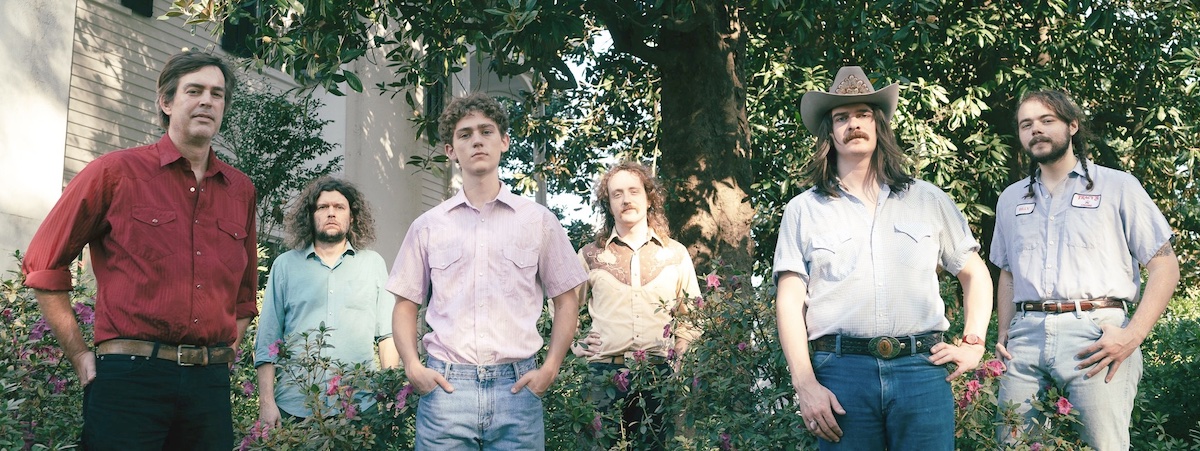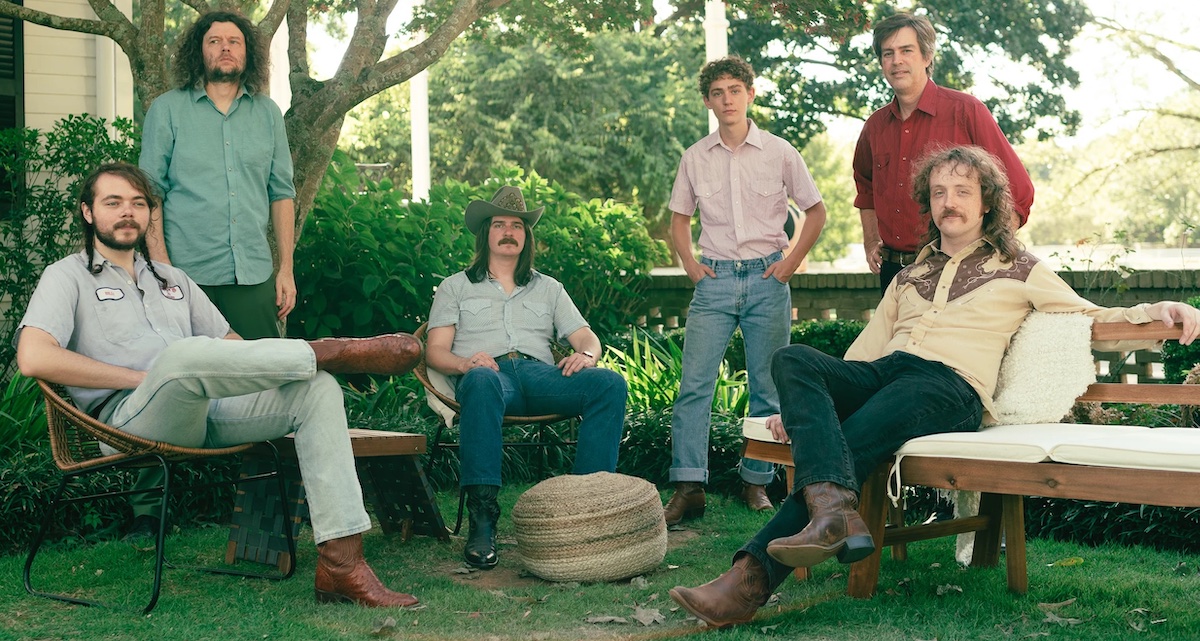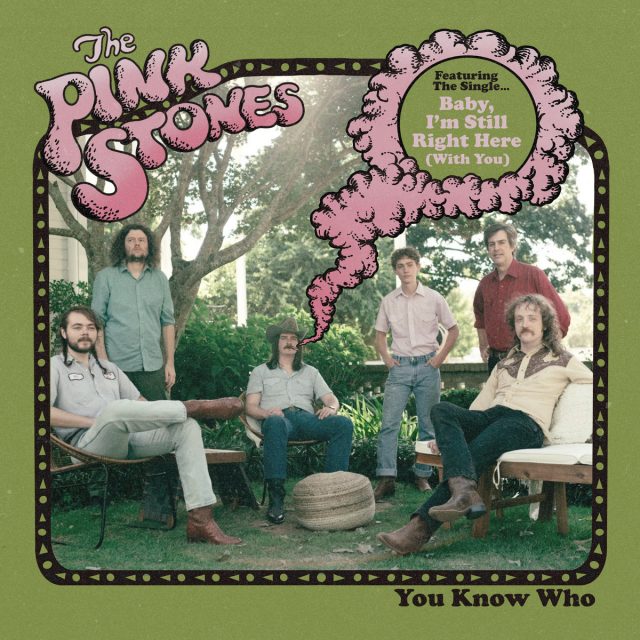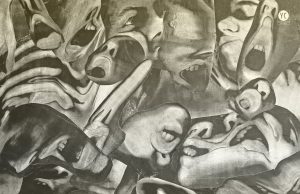THE EDITED PRESS RELEASE: “This record was me trying to take everything I love as a listener and a player and shove it all into one thing without it sounding random,” says Hunter Pinkston, former punk-turned-cosmic country auteur, describing You Know Who, the boisterous, ambitious sophomore album by his band The Pink Stones.
Ostensibly they play country music, yet all the pedal steel sobs, the two-steppin’ rhythms, twangy harmonies, and lyrics about broken hearts and long days on the road are launchpads for wild experiments and unexpected stylistic forays. “There’s obviously a lot of country and rock in our music, but there’s a lot of gospel and soul and psych and dub. I really wanted to get all of those things living peacefully together in one record.”
Made up almost entirely of Athens musicians who play in other bands around town (including former members of Drive-By Truckers and Glands), The Pink Stones match their frontman’s vast musical vocabulary while adding their own twists to spacey honkytonk, pedal-to-the-metal trucker anthems, and ecstatic gospel. Together, they have the range to be whatever they need to be at any given moment, embracing the spirit of musical freedom that has animated the local music scene for more than forty years. Yet The Pink Stones sound like no other Athens band. “We have the space to be free here in Athens and do whatever we want,” says Pinkston. “We get to do our own thing, and there are a million other really good bands doing their own things here as well. Everyone is friends with everyone else, and everyone’s doing something constantly, so you’re always hearing something new. And you always have to stay on your toes.”

The success of their 2021 debut, Introducing…The Pink Stones, took them far away from home and kept them out on tour for long stretches. That album laid out the parameters of their sound, winning accolades from multiple outlets and earning comparisons to Gram Parsons, The Byrds, and The Grateful Dead. But when they took those songs on the road, they busted right through all of those parameters, pushing their music in new directions and coalescing into a tougher, tighter live act. Very quickly The Pink Stones developed a reputation for their raucous rock shows, and the intensity, ingenuity, and unpredictability they cultivated on stages across America informs their sophomore album.
After recording Introducing…The Pink Stones at Chase Park Transduction — the legendary Athens studio that has hosted sessions by the Truckers, Faye Webster, Deerhunter and many others — this time The Pink Stones recorded miles from any professional studio. They set up at the home of Henry Barbe, son of Chase Park owner David Barbe and frontman for The Hernies. “It was way looser,” says Pinkston. “We were able to take our time and have a little more fun. Sessions went later into the night. We did the live band thing where we tracked the whole record live and then went back to do a few overdubs.”
They’d already worked out most of these songs on stages across America, especially the rip-roaring Who’s Laughing Now?, which hides its aching heart behind a big singalong chorus. They tackled it in one or two quick takes, then passed it along to friends and frequent tourmates Teddy & The Rough Riders, who added harmonies. “We did that song on tour with them, and I always loved the way they sounded on it. I always like to bring in as many of my friends to do stuff on a record as possible.”
Pinkston put the band on the spot, however, by showing them some of the newer songs right when they were walking in Henry’s door each morning. He wanted to see how they might bring them to life, how they might expand his ideas in ways he couldn’t dream up. That approach lends Time’s Standing Still its ramshackle grandeur. It opens with a slow-motion boogie-rock riff, then shifts abruptly into a weird dub-waltz chorus, toggling back and forth as Pinkston ponders his own culpability in getting his heart broken. “I had never shown that song to anyone before we tracked it. I just showed up at Henry’s and told them, This is the key we’re in. Here are the lyrics. Let’s just see what happens. It’s weird in retrospect, because that song has so many feel changes. It’s maybe the worst one not to have shown to anyone, but they still nailed it.”

Heavy touring has honed The Pink Stones’ attack, giving them the ability to chase down any wild scheme, but it’s also made Pinkston more confident as a songwriter who catalogs his feelings of alienation, isolation, loneliness, and yearning with wit and acuity. “There’s been a lot of growth and change in my life since we made our debut, and I’ve been feeling more comfortable as a songwriter, more at home as a person who plays music and expresses himself in lyrics.”
Writing about a recent breakup, he forgoes easy recrimination in favor of self-examination, especially on the rambunctious duet Baby, I’m Still Right Here. They’d been playing the song live for a while, but Pinkston felt something was missing: another voice in the mix, another side of the story, a Tammy to his George. He asked their labelmate Nikki Lane to help him turn it into a duet, admitting, “I didn’t give her very much direction. I just sent her the lyrics and a version of me singing the whole thing. Just do whatever feels right to you. I remember being on edge while she was recording, although in retrospect I didn’t need to be. The song is all the better and deeper for her being on it.”
While Pinkston is hesitant to call You Know Who a coming-of-age album, the trials and rewards of adulthood — with all of its responsibilities and disappointments, wisdom and contradictions — animate every song. “I wanted this one in particular to be a snapshot of us in the past year or so. We’ll make more music together and record different records, but this is where we are right now in our lives. It’s fun and freeing to be able to give the songs that kind of space, to let them be what they need to be at that time, and then let them go.”











































